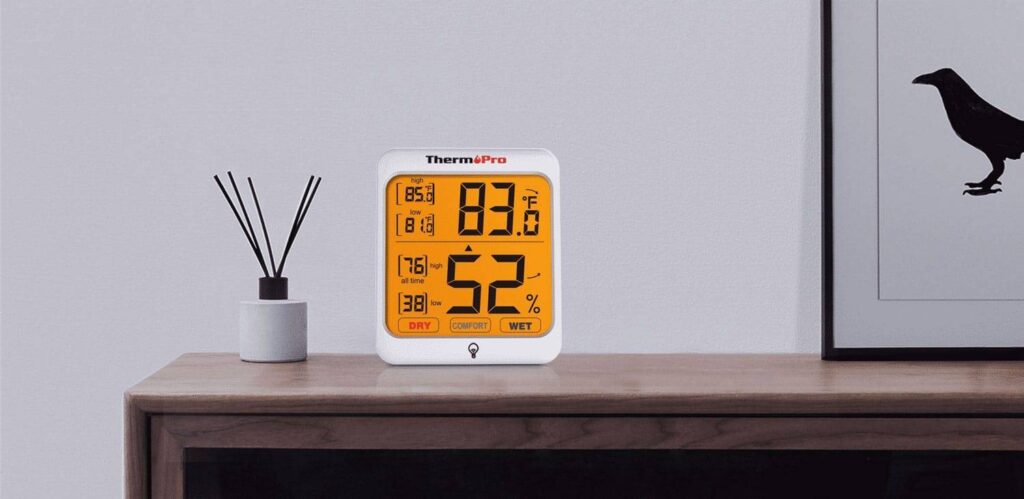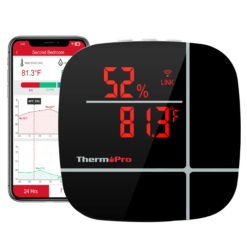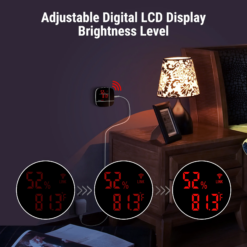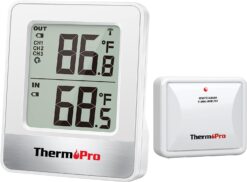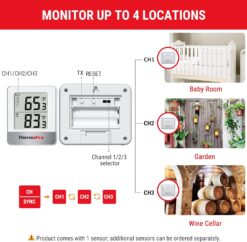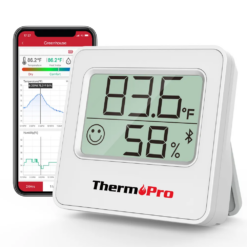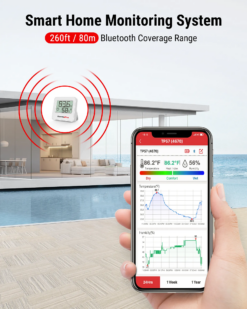In Kenya’s dynamic business environment, managing operational costs efficiently is key to staying competitive. Humidity control, though often overlooked, plays a critical role in reducing losses and maintaining the quality of products. Smart hygrometers, which offer WiFi and Bluetooth connectivity, have emerged as a game-changer in this area. They allow businesses to monitor humidity levels remotely, preventing costly damages to inventory and infrastructure.
From warehousing to agriculture, cold storage, and pharmaceutical storage, smart hygrometers offer accurate, real-time data that can be accessed remotely through apps on smartphones or computers. In this article, we’ll explore how these devices help businesses in Kenya save money by preventing humidity-related issues and optimizing environmental control.
The Value of Real-Time Humidity Monitoring
Traditional hygrometers measure and display humidity levels, but smart hygrometers take this a step further by allowing users to monitor conditions remotely. In businesses where humidity needs to be closely managed, real-time monitoring can be the difference between preventing damage and incurring significant losses.
WiFi-enabled models like the ThermoPro TP90 and Bluetooth models like the ThermoPro TP357 are ideal for Kenyan businesses across various sectors. These devices provide continuous updates on humidity and temperature, which can be accessed remotely through mobile apps. This means managers and business owners can stay informed about warehouse or storage conditions without being physically present, helping them take proactive steps to address any issues before they lead to financial loss.
Use Cases: How Smart Hygrometers Save Money in Different Industries
1. Warehouse Management
Warehouses store a variety of goods, from electronics to food products, each with its own specific humidity requirements. High humidity can damage products, especially those sensitive to moisture, like grains, electronics, and metals. Smart hygrometers help prevent these issues by providing real-time humidity data and alerts when levels exceed safe thresholds.
For example, the ThermoPro TP90, which connects via 2.4GHz WiFi, allows warehouse managers to track conditions from any location. If humidity rises to dangerous levels, the device will send an immediate alert to the user’s phone. This timely warning allows the manager to adjust ventilation systems or activate dehumidifiers before any damage occurs. Over time, this can save businesses money by reducing the costs associated with product spoilage, corrosion, or mold growth.
Cost Savings:
- Prevents product losses due to high humidity.
- Reduces maintenance and repair costs for warehouse infrastructure.
- Lowers energy costs by optimizing the use of dehumidifiers and ventilation systems based on real-time data.
2. Cold Storage and Perishable Goods
Kenya’s agricultural sector heavily relies on cold storage facilities for fruits, vegetables, dairy products, and other perishables. In these environments, both temperature and humidity must be carefully controlled to avoid spoilage. If humidity levels get too high, condensation can occur, leading to mold growth or product deterioration.
The ThermoPro TP200B and TP60C, both waterproof hygrometers, are ideal for cold storage facilities. Their wireless functionality enables remote monitoring, while their durable design makes them suitable for use in high-moisture environments. Business owners can monitor conditions remotely and make adjustments as needed, ensuring their perishable goods remain in optimal condition.
Cost Savings:
- Minimizes the risk of perishable goods going to waste due to improper storage conditions.
- Ensures compliance with food safety standards, avoiding penalties or product recalls.
- Reduces energy use by providing accurate humidity data, enabling precise control of dehumidifiers and cooling systems.
Indoor Thermometer
ThermoPro TP200B: Waterproof Thermometer – Outdoor & Indoor Thermometer
3. Greenhouses and Agriculture
Greenhouses in Kenya, especially those involved in high-value crop farming such as flowers and vegetables, require precise humidity control for optimal plant growth. Humidity that’s too high can promote mold growth and fungal infections, while humidity that’s too low can cause dehydration in plants, affecting yields.
Bluetooth-enabled devices like the ThermoPro TP357 allow greenhouse managers to keep tabs on humidity levels through their phones, even when working in different sections of the farm. This means that the data is always available, and immediate actions can be taken to prevent unfavorable conditions.
Cost Savings:
- Improves crop yields by maintaining optimal humidity levels.
- Prevents crop losses due to mold, mildew, or dehydration.
- Reduces energy consumption by optimizing the use of greenhouse ventilation and humidification systems.
4. Pharmaceutical and Medical Storage
Medical facilities and pharmaceutical companies in Kenya must maintain strict environmental conditions to store medicines, vaccines, and other sensitive products. Fluctuations in humidity can lead to degraded efficacy of medications or even contamination. Smart hygrometers provide reliable humidity data to ensure that these sensitive products remain in optimal condition.
For instance, the ThermoPro TP90 is an ideal choice for pharmaceutical storage facilities. With its WiFi connectivity, it transmits real-time data that can be monitored remotely, ensuring that corrective actions are taken immediately if there are any deviations from the required humidity levels. This helps avoid expensive product spoilage or compliance issues.
Cost Savings:
- Protects the integrity of pharmaceuticals and medical supplies, preventing costly spoilage.
- Ensures regulatory compliance, avoiding fines or the need for product recalls.
- Reduces energy costs by providing accurate data to manage HVAC systems efficiently.
Remote Monitoring and Alerts: The Game-Changer
The ability to monitor humidity levels remotely is what truly sets smart hygrometers apart from traditional models. In large warehouses, agricultural operations, or pharmaceutical storage units spread across various locations in Kenya, physically checking each hygrometer is time-consuming and inefficient. Smart hygrometers remove this burden by offering real-time data and notifications.
With devices like the ThermoPro TP90 or TP357, business owners and managers can monitor multiple facilities from a single app, setting thresholds for humidity and temperature. If conditions move outside these limits, an alert is sent, allowing swift action to prevent problems. For example, if humidity rises in a warehouse storing electronics, the facility manager can activate dehumidifiers or adjust ventilation remotely.
This proactive approach not only reduces labor costs but also prevents costly damages caused by delayed responses.
Increased Efficiency with Data Logging
Many smart hygrometers, such as the ThermoPro TP357 and TP358, come with data logging features that record historical humidity and temperature data. This information is invaluable for businesses looking to optimize their operations.
By analyzing the data, businesses can identify trends and patterns, helping them predict when humidity levels are likely to rise and take preventive action. This leads to more efficient management of resources, as dehumidifiers and HVAC systems can be used only when necessary, rather than running constantly.
Cost Savings:
- Optimizes resource use by running humidity control systems only when required.
- Helps prevent wear and tear on dehumidifiers and HVAC systems, reducing maintenance costs.
- Enables long-term planning and improved decision-making based on historical data.
Conclusion: Smart Hygrometers as a Cost-Saving Solution
Smart hygrometers offer businesses in Kenya an effective, reliable, and cost-efficient way to monitor and control humidity levels across various industries. Whether managing a warehouse, greenhouse, cold storage facility, or pharmaceutical storage unit, these devices help prevent product losses, optimize resource use, and reduce operational costs.
By investing in smart hygrometers like the ThermoPro TP90, TP357, or TP200B, Kenyan businesses can safeguard their assets, improve efficiency, and increase profitability – proving that even small investments in smart technology can lead to significant financial savings.

